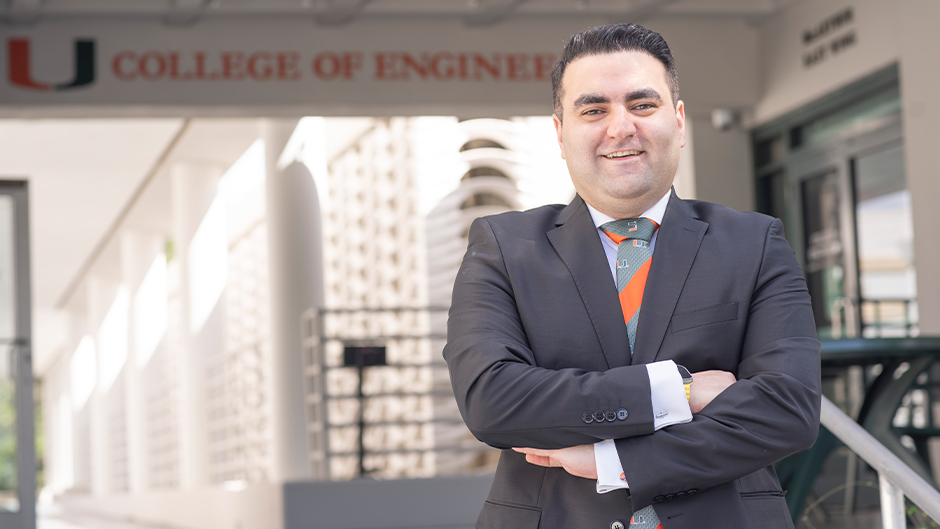Nima Khodadadi, Ph.D., a civil engineering doctoral student at the University of Miami College of Engineering, recently received a prestigious career development award from the National Science Foundation. Supported by the NSF’s Non-Academic Research Internships for Graduate Students (INTERN) program, Khodadadi will work with the Inter-American Cement Federation (FICEM) on developing carbon reduction strategies for the concrete industry.
“We need to use artificial intelligence (AI) and machine learning applications to create a sustainability model that includes both static and dynamic variables,” said Khodadadi. “I consider it an honor to be selected for this internship, which provides an opportunity to strengthen the University of Miami’s role on an international level.”
NSF's INTERN program provides graduate students with experiential learning opportunities through research internships in non-academic settings. This summer, Khodadadi will begin his six-month remote and in-person internship with FICEM.
FICEM represents over 25 of the largest cement producing companies, institutes, and associations in Latin America, the Caribbean, Spain, and Portugal. The organization promotes climate protection, energy efficiency, the use of alternative fuels and raw materials, as well as socially-beneficial applications of cement and concrete–housing, pavements, and infrastructure, among others.
Advancing AI in engineering
A native of Iran, Khodadadi earned a bachelor's degree in civil engineering and a master's degree in structural civil engineering from the University of Tabriz. He obtained his first Ph.D. in structural engineering at the Iran University of Science and Technology, one of the nation’s top universities, exploring artificial intelligence, machine learning, and metaheuristic algorithms. To date, he has written more than 50 papers–16 since coming to the US last year–and 10 book chapters relating to concrete and sustainability.
In the College of Engineering, Khodadadi is working on his second doctoral degree with Antonio Nanni, Ph.D., P.E., professor and chair, Department of Civil & Architectural Engineering. "He saved my life in the USA," Khodadadi said of Nanni. "It's such a great honor to be accepted as his Ph.D. student and to work so closely with him."
Khodadadi has also been active in the UM Graduate Student Association (GSA) serving as a senator and a member of the e-board. He was named a 2023 Academic Excellence Awardee in his first semester at the University of Miami.
In his research, Khodadadi has looked at a wide range of parameters affecting sustainability in the construction sector. That includes manufacturing processes, as well as transportation and supply chain issues. “Ideally, we should be able to tell whether it is better, in terms of sustainability, to transport concrete from Tampa or Orlando to a Florida job site,” he said.
Khodadadi is also incorporating non-industry factors such as the financial market into his sustainability research. Increasing the price of carbon-neutral bonds or other financial instruments, for example, could make sustainable manufacturing processes more attractive to the industry.
“With such big data sets, we need to apply machine learning and AI algorithms to find the most sustainable solutions,” Khodadadi said. “Since concrete produces more than 8 percent of the world’s carbon dioxide emissions, civil engineers have an excellent opportunity to contribute to sustainability on a global basis.”

